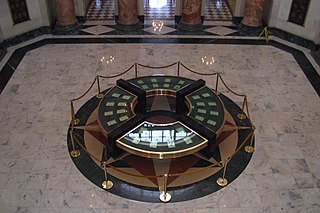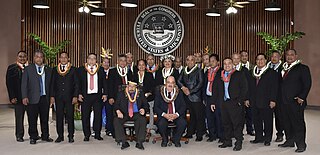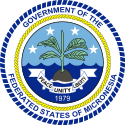
Article Four of the United States Constitution outlines the relationship between the various states, as well as the relationship between each state and the United States federal government. It also empowers Congress to admit new states and administer the territories and other federal lands.

The Fourteenth Amendment to the United States Constitution was adopted on July 9, 1868, as one of the Reconstruction Amendments. Usually considered one of the most consequential amendments, it addresses citizenship rights and equal protection under the law and was proposed in response to issues related to formerly enslaved Americans following the American Civil War. The amendment was bitterly contested, particularly by the states of the defeated Confederacy, which were forced to ratify it in order to regain representation in Congress. The amendment, particularly its first section, is one of the most litigated parts of the Constitution, forming the basis for landmark Supreme Court decisions such as Brown v. Board of Education (1954) regarding racial segregation, Loving v. Virginia (1967) regarding interracial marriage, Roe v. Wade (1973) regarding abortion, Bush v. Gore (2000) regarding the 2000 presidential election, Obergefell v. Hodges (2015) regarding same-sex marriage, and Students for Fair Admissions v. Harvard (2023) regarding race-based college admissions. The amendment limits the actions of all state and local officials, and also those acting on behalf of such officials.
A constitutional amendment is a modification of the constitution of a polity, organization or other type of entity. Amendments are often interwoven into the relevant sections of an existing constitution, directly altering the text. Conversely, they can be appended to the constitution as supplemental additions, thus changing the frame of government without altering the existing text of the document.

The Constitution of the Commonwealth of Puerto Rico is the controlling government document of Puerto Rico. It is composed of nine articles detailing the structure of the government as well as the function of several of its institutions. The document also contains an extensive and specific bill of rights. It was ratified by Puerto Rico's electorate in a referendum on March 3, 1952, and on July 25, 1952, Governor Luis Muñoz Marín proclaimed that the constitution was in effect. July 25 is known as Constitution Day.
United States v. Wong Kim Ark, 169 U.S. 649 (1898), was a landmark decision of the U.S. Supreme Court which held that "a child born in the United States, of parents of Chinese descent, who, at the time of his birth, are subjects of the Emperor of China, but have a permanent domicile and residence in the United States, and are there carrying on business, and are not employed in any diplomatic or official capacity under the Emperor of China", automatically became a U.S. citizen at birth. This decision established an important precedent in its interpretation of the Citizenship Clause of the Fourteenth Amendment to the Constitution.

The proposed Citizenship Reform Act of 2005 was a U.S. congressional bill introduced in the 109th United States Congress by Re. Nathan Deal (R-GA). The legislation aimed to deny birthright citizenship to individuals born in the United States whose parents were not citizens or permanent residents.
United States citizenship can be acquired by birthright in two situations: by virtue of the person's birth within United States territory or because one or both of their parents was a U.S. citizen at the time of the person's birth. Birthright citizenship contrasts with citizenship acquired in other ways, for example by naturalization.

Parliamentary elections were held in the Federated States of Micronesia on 6 March 2007, alongside a double referendum. Thirty-five candidates competed for the fourteen seats in Congress. As there were no political parties, all candidates ran as independents.
The Citizenship Clause is the first sentence of the Fourteenth Amendment to the United States Constitution, which was adopted on July 9, 1868, which states:
All persons born or naturalized in the United States, and subject to the jurisdiction thereof, are citizens of the United States and of the State wherein they reside.
The Constitution of the State of Maine established the "State of Maine" in 1820 and is the fundamental governing document of the state. It consists of a Preamble and ten Articles (divisions), the first of which is a "Declaration of Rights".

The Constitution of the State of Nevada is the organic law of the state of Nevada, and the basis for Nevada's statehood as one of the United States.
Non-citizen suffrage in the United States has been greatly reduced over time and historically has been a contentious issue.
The Constitution of the Philippines is the constitution or the supreme law of the Republic of the Philippines. Its final draft was completed by the Constitutional Commission on October 12, 1986, and ratified by a nationwide plebiscite on February 2, 1987.

The Constitution of Kenya is the supreme law of the Republic of Kenya. There have been three significant versions of the constitution, with the most recent redraft being enabled in 2010. The constitution was presented to the Attorney General of Kenya on 7 April 2010, officially published on 6 May 2010, and was subjected to a referendum on 4 August 2010. The new Constitution was approved by 67% of Kenyan voters. The constitution was promulgated on 27 August 2010.

Parliamentary elections were held in the Federated States of Micronesia on 8 March 2011, alongside a three-part referendum. As there were no political parties, all 34 candidates ran as independents. For the first time in the country's history, two women ran for election, both in Chuuk State. However, neither was elected.

A constitutional referendum was held in the Federated States of Micronesia on 27 August 2002. Voters were asked whether they approved of 14 separate amendments to the country's constitution. To be approved, the proposal required at least 75% of voters in at least three of the four states to vote in favour. Ultimately all 14 proposals were rejected, as none passed the 75% threshold in any state.

A twenty-three-part referendum was held in Palau on 4 November 2008 alongside the country's general elections. Voters were asked questions on requirements of citizenship to hold office, government provision of primary school and health care, the definition of marriage and term limits for Parliament. Only the proposal permitting naturalization for certain adoptees failed to obtain the requisite majority of the vote and majority in 3/4th of the states.

The Supreme Court of the Federated States of Micronesia is the highest court in the Federated States of Micronesia. It was established by Article XI of the Constitution of the Federated States of Micronesia. It has both a trial division and an appellate division. The appellate division can hear both appeals from state courts and from the trial division: justices serve in both the trial division and the appellate division of the court, but cannot sit on an appeal of their own decision.

A referendum on nine proposed amendments to the constitution was held in Micronesia on 4 July 2023. Eight of the amendments were proposed by the Constitutional Convention elected in 2019, and one amendment was proposed by Congress. All nine amendments passed, and were officially ratified by President Simina on 4 October 2023.
The Constitution of the State of Yap, one of the four states of the Federated States of Micronesia, is the fundamental legal text of the State of Yap. It was adopted in 1982, promulgated on December 24 of the same year and came into force on January 1, 1983. Amendments were adopted by referendum and promulgated on November 24, 2006. The constitution comprises 15 articles. It can be consulted in English on the website of the Supreme Court of the Federated States of Micronesia.








